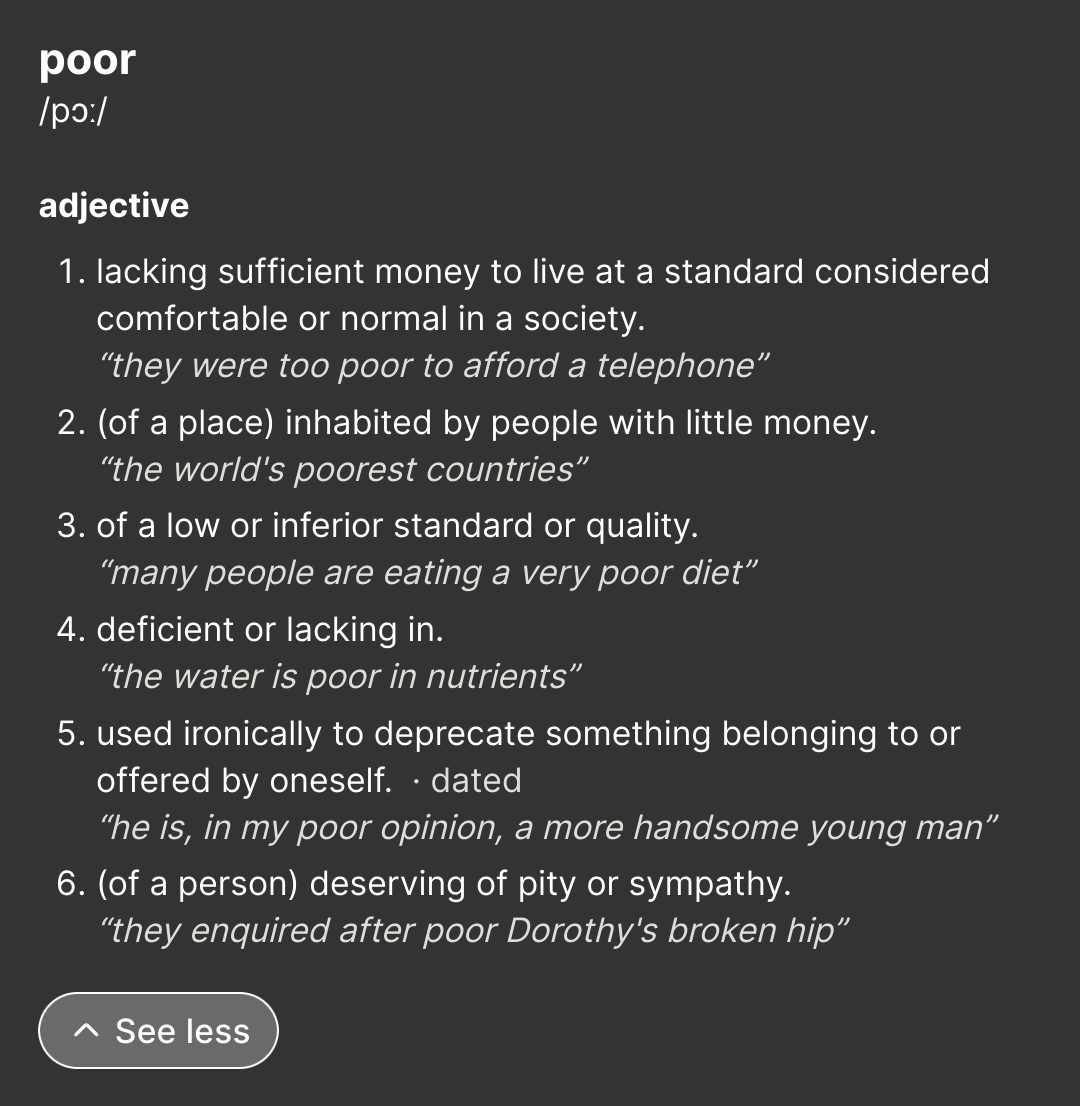- cross-posted to:
- brainworms@lemm.ee
- cross-posted to:
- brainworms@lemm.ee
Those silly commies don’t understand that you have to bail out capitalists when they fail.
China need to up their can-kicking game

Oh the horrors of billionaires not getting their treats 😢
But what about the poor billionaires 😢
So are they poor or rich? Make up your mind!
See definition 6

I am aware, yes. I should add an /s at the end next time.
No, people need to learn how to recognize sarcasm again.
I disagree. Especially on the internet, it can often be very difficult to say what is sarcasm and what is not. This is mostly because of the wildly diverse opinions that people have.
Based China
It’s actually quite funny how people foresaw the downfall of the Chinese economy following Evergrande, and it just kinda carried on as normal because the Chinese govt refused to bail them out.
No doubt some people are gonna get burned by that policy too, but they made the right choice by not rewarding a company that clearly had significant financial management issues.
Meanwhile here in italy when a major company fails and goes bankrupt because of shitty management, corruption and greed, we first “save” it with public funds, then sell it to someone else to profit off of it
A massive corporation going out of business sucks in the short term: people lose their jobs, among other financial woes. But if you keep bailing out failing corporations, you harm your economy in the long run because you’re keeping a company artificially on life support using budget funds. The company will continue to fail and lose money, setting your country back years in terms of productivity and innovation, and your economy will fold inwards.
Not only that company but any other one is going to be incentivized to be irresponsible with their accounting and financial practices. What’s going to happen if Google or Microsoft broke? Are they going to be rescued too?
Property developers in China, unlike banks in the US, are not the backstop of the economy. They are not too big to fall: it’s just that their distressed assets need to be managed to minimize losses to their customers.
General Motors isn’t the backstop of the economy and they were rescued too.
Normalize not bailing out failing big businesses, hope we can bring that custom over here.
Iceland got back on its feet after 2008 with a quickness because they jailed a bunch of bankers.


Common China W
Wow, actual Moral Hazard?!
Yes but can they please do this without leaving half finished skyscrapers in other countries? The situation in LA kind of sucks now that the city has to spend millions cleaning it up (supposedly sending the bill to a bankrupt Chinese developer, as if that’ll work).
China has said they are going to take over projects under construction to finish them, which is good.
However, China still has to deal with a property glut, an elderly population who mainly used real estate to save for retirement, and local governments who needed real estate development to fund their budgets.
China is going to have to spend significant parts of its surplus dealing with this.
A property glut? Look at China’s urbanization rate. A short-term oversupply is easily consumed by increasing urbanization. You cannot apply the American model to an economy in a different state of development.
This has been an internal Chinese determination. China has stopped building large skyscrapers and mass transit with this being determined on the national level since pre-Covid.
They don’t “have to” clean up the totally innocuous graffiti
This is true. It’s become a bit of a tourist attraction.
The value of the property has to be greater than the bill though, right?
No, and that’s the problem. Ever since Covid, people are leaving major cities and moving to more affordable locations. This is largely due to this new work from home culture. Thus, a lot of these grand skyscraper projects are falling apart globally, the news just likes to focus on China, which in fairness is the largest failure of all the nations.
It’s also important to note that while there is an abandoned skyscraper by a Chinese developer in LA, there are also abandoned skyscrapers in NYC and SF that has nothing to do with China. It’s just a bad market for new buildings since people are leaving cities.
Of the finished property, probably. A property with a giant, abandoned project on it isn’t worth nearly as much.
Unlike U.S. bailing out “too big to fail”, China says “fuck you - we keep the tax dollars for us.”.
Near perfect capitalistic communism as is possible.
I’m sure there is a lot more nuance and context here that I don’t know about, but at face value that’s a pretty cool solution and I like it. The question is: how much of these developments were greenlit by government officials who are now refusing to foot the bills?
It sounds good because it sounds like the developers are the ones getting fucked over. But that’s not really the case. They already made bank.
Chinas real estate development sector is mostly funded by pre-selling future projects. So the people who bought a unit that now never will be built are the ones truly getting fucked over. And while some of these people are other rich people planning on renting out these units, a big part are just regular people. Only about 25% of the population in China are renting. In some cities the percentage is higher but even in Shanghai and Beijing it’s only around 35%.
So a lot of the people who are getting fucked over by this are people who bought their own home that now will never be finished. On the bright side they probably haven’t paid the full amount yet but for many their entire lifesaving are still gone and saving up enough money to buy a new home will take a long time.
Sure the developers may lose a lot of net worth because their company isn’t worth anything anymore. But they still have way more assets in their possession then they need.
That’s a very thoughtful in depth response. It honestly confuses me to no end that the developers can somehow not afford to complete the projects but were also allowed to sell the properties beforehand. That makes no sense, if I knew Chinese I would be fact checking those statements. On the other hand, such scams rarely do make any sense in retrospect.
The situation is way more complicated, it isn’t a simple scam. It certainly didn’t start out that way. The developers fully inteded on building these homes (at least until recently). And the business model was sound and generally works.
Pre-selling of units in apartments/condos is common around the world and a key part of securing the cashflow for the project. Chinese developers were operating just as anywhere else. The model is - use internal funding + pre-selling to build the project, then sell the remaining units once done. Use the money from selling the finished units to pay for the next project. Since demand for homes was super high, they started planning the next project before the first one was finished. Same as anywhere else in the world. The issue started that finished projects didn’t sell the remaining empty units at the expected rate. Eventually the capital of the development company was mostly used up and the cashflow from finished projects dried up. So they had a lot of half built projects and the only money available was that from projects even further in the future. And that’s not sustainable and here we are now.
There are three big factors why the finished units didn’t sell.
-
Pre-selling is cheaper. So homeowners opted for that. You usually are given a decent discount and have much easier payment terms. You often have a few years of monthly payments before the lump-sum is due. So by the time you need that mortage you already have 10-30% equity in the unit. Making the mortage lower and easier to get. And if your financial situation changed, you can even sell the unit before the lump-sum is due.
-
China has rather restrictive rules on owning land. In many muncipialities, and especially in big cities, people are only allowed to own 1 or 2 residential homes (there are ways around it). Foreign entities aren’t allowed to own residential properties for investment purposes in general. So unlike in the west where you have a conglomerate of investors buying up all the homes with the plan of making their money back by renting them out, Chinese investors have to rely on people buying their own home for personal use. Which means there is no real option of selling empty units on mass for a lower price.
-
The rate of rural to urban migration slowed down. In the past few decades China experienced some of the fastest growth of urbanization ever. Tons of people coming from the countryside to live in the city. This created the illusion of near limitless demand for homes. But now it’s very likely that the Chinese government lied about their population. So the demand for homes can’t be as high as expected but on top of that, migration to urban areas has slowed down.
Now a lot of these things have been known for years. And nobody really did anything. So I personally think calling all of this a scam is fair at this point. But the Chinese government could step in and help out their population. If these developers really go bankrupt, the government could just seize all of the empty unsold units and redistribute them to people who got fucked over. It isn’t perfect but it’s better than not having a house. The big question is just, how many of these units are actually habitable. China has questionable building methods to begin with and on top of that many of the buildings were so empty that there was no money to pay for maintainance. So alot of these homes are death traps. And I suppose no home is better than a death trap.
That’s basically the entire definition of what a Ponzi Scheme is, though.
-
waow
Y’all are dancing on this, but if they go through with it, this is going to cause a run of panic that will wipe out the savings of hundreds of millions of people.
It would in the west, in China they do a controlled crash, i mean it’s already happened, one of their biggest housing companies already crashed and it did not caused anything except rise in home ownership among the people.
There’s a high percentage of Chinese workers that invested their savings in real estate instead of having a pension.
And there’s no welfare*, which means a lot of people who will be left on the street when they are too old to work.*After a complain, I did some research so I can provide enough clarity on my statement:
- A new pensions system was built on top of the previous communist system (1986~1990s), then in 2004 the gov added enterprise annuities and finally, an IRA system was launched.
This last part was launched in 2022, which finally covered about 1.05 billion people. - There is though a difference in which plan can someone join, depending on their residence permit (either rural or urban).
The residence permit doesn’t have a link to where you live, so a rural hukou won’t become an urban hukou just for moving to the city. - Why does this matter? Well, an urban hukou will get about $461 US dollaridoos, while the Old-Age Insurance for Urban and Rural Residents plan (entirely used for rural residence permit holders and unsalaried urbant residents), it’s about $25 US dollars and a smile.
The why enterprise annuities didn’t work (0.25% of companies enrolled) is a very complex one but let’s say is mostly due to the abnormally high statutory pension contribution rate.
So up until 2022, a little more than 500 million people had few options for extra savings beyond those $25 dollars/person, and that was real estate (you know, the thing that always goes up).
With IRAs now, and a possible conversion from the two main basic pension plans into a centralized one, it’s possible newer generations will have a foothold for a safer savings method, however there are several challenges on the horizon:
- All the economic turmoil of COVID-19, foreign firms moving out, pandemic lockdowns, etc… is making it harder to strengthen the pension system.
- Demographic issues and high youth unemployment.
- Runs on small banks.
- Recent cuts on local health care benefits.
- The statutory pension contribution rate was lowered, but is still about 16% Iirc. This means though the pension bags are getting 4% less full every year.
Altogether this could very well be a ticking time bomb.
And there’s no welfare [in China]
Lol. They’re really scraping the bottom of the barrel with China Bad propaganda
There has always been and will always be government bonds.
?
Ah NOW it makes sense.
There’s a high percentage of Chinese workers that invested their savings in real estate instead of having a pension.
That’s why no bailout. Only the regular folks getting curbstomped by this one.
Edit - Well, this was a wildly unpopular comment, but I don’t know why. 8 people who think everyday folks are as likely to be bailed out as the 1% I guess. Since none of them bothered to comment, I can only speculate.
China has said they will bail out the regular people. What they’re doing is they’re buying the homes at a discounted price from the people and turning them into subsidized housing. To quote the article:
“We will scale up the building and supply of government-subsidized housing and improve the basic systems for commodity housing to meet people’s essential need for a home to live in and their different demands for better housing,”
So there’s no bailout for the property developers but they are controlling the loss for regular folks.
I’m sorry people downvoted you without explaining that. I know it’s hard to read the entire article sometimes.
Ah well my cynicism was unwarranted and I should have more than skimmed the article. Thanks for the clarification.
Well it’s also important to note that western media is intentionally not reporting on this properly and putting what I said as remarks at the end of articles. There’s two reasons for this.
-
This has never happened before. Countries usually just bail out their property developers and hope they’ll build cheaper housing. IE USA Circa 2008. So we really don’t know what the outcome of this is. Wall St of course hates this and is terrified of this. I mean if it works and other countries follow suit in the future, what would that mean for all the Wall St. billionaires.
-
Obviously the usual China bad narrative. The west really really doesn’t want any Chinese actions to be viewed in a positive light.
So here’s a Korean article that explains it better and isn’t as influenced by western media.
The key take away point is, stop believing US media, it’s absolutely shit propaganda. I’m not saying China is good, hell I agree with the Koreans that this might not work, but for the love of god don’t believe USA.
You are also having people with a wrong understanding of the Chinese property crisis by trying to map it to the American Great Recession, when the two problems are very different.
For instance, Evergrande is a real estate developer, not a bank. Evergrande going broke is like if Toll Brothers went broke in the USA. It would be bad, but it isn’t the end of the financial world.
Second, China doesn’t have the mortgage industry that the USA does. China has mortgages, but a large part of the market is owned as investments. You also have to pay a lot more as a down payment compared to the USA. So, the exposure that the Chinese banking industry has to this is a lot less than what happened in the USA in 2007/8. However, this means that people are more at risk in losing money on their real estate.
Third, while housing in the USA is an investment that some people take, there are generally other ways Americans invest their money to save for retirement. In China, a greater percentage of the population saves for retirement by buying property. Given China’s demographic issues, this can be a problem if a lot of retirees lose a significant part of their nest eggs.
Fourth, municipalities and provinces can’t set their own taxes and the national government hasn’t been giving them enough money to pay for services. Local revenue generation has been handled through real estate development. There has not been a plan released yet to handle the loss of revenue or dealing with municipal debt. National plans for real estate development are removing the profit incentive, so how does that impact local budgets?
Some of these points are covered in your article. However, even in this thread, the discussions seem to be trying to view China’s property crisis through an American lens when the mechanics behind both are very different.
-
Don’t be sorry that people downvoted. This site attracts uninformed bullshit like flies to shit, and a lot of us are just tired of explaining to everyone that the facts are there in the article. My limit is 25 wildly incorrect but confident comments before I stop trying to inform people.
- A new pensions system was built on top of the previous communist system (1986~1990s), then in 2004 the gov added enterprise annuities and finally, an IRA system was launched.
What about all those unfinished buildings that people got in debt to buy?
They are not needed. There is no one to live in them.
They have over a billion excess homes. It was the only thing that normal people could invest in so they just kept building.
If you bought one as an investment, nobody is going to buy them from you. They are worthless.
So what are you going to do with the millions of people relying on that for their retirement savings?
🤷♂️
IMO Social Security is a better solution because not everyone has extra money to invest, and any class of investment can crash.
But what is the actual real-world practical solution for those people?
Are they now just going to be broke (or even in debt) with no place to live?
Someone buying an unfinished building likely already has a home. If they don’t they can buy one for much cheaper now since housing prices have gone down cuz of the real estate bubble popping.
They have over a billion excess homes.
Which is good, because it keeps costs of living down, amiright?
After 2008 they’re gambling, not investing.
Evergrande already went bankrupt in 2021 and the general population in China have been mostly shielded from the damage (except the poor billionaires though 😢)
How were they shielded? Do you have a source I can read? I’m genuinely interested.
I remember reading that there were protests because people bought condos and were essentially told they were never going to get completed. Did those people get a refund from the government or the company?
Not afaik. Anyone buying an unfinished condo though likely already has a home, specially since China’s home-ownership is about 90%.
And if they don’t, they can buy one for much cheaper now cuz house prices have gone down thanks to this real estate bubble being popped. And China already has 600 million vacant homes.

This also coincides with the CPC moving funding from the overinflated real estate sector to the high tech sector btw.

particularly EVs

Geopolitical economy report has a more in-depth video on this.
Here is an alternative Piped link(s):
Geopolitical economy report has a more in-depth video on this
Piped is a privacy-respecting open-source alternative frontend to YouTube.
I’m open-source; check me out at GitHub.
wipe out the savings
It’s zero sum to the population. Every dollar lost by an investor is a dollar saved by a new family buying a home.
I dont care about investors when their investing in real estate has caused housing to skyrocket in price and making renting the only option for many people, myself included, while at the same time those same people will rent out at astronomical rates making many of us live more than paycheck to paycheck.


















